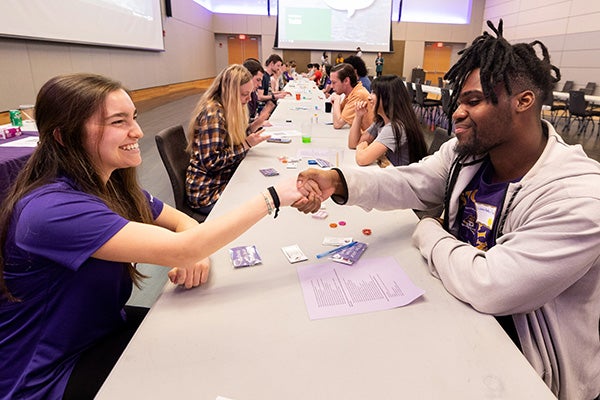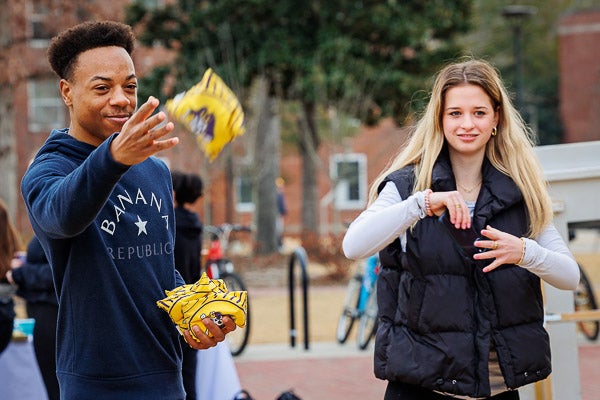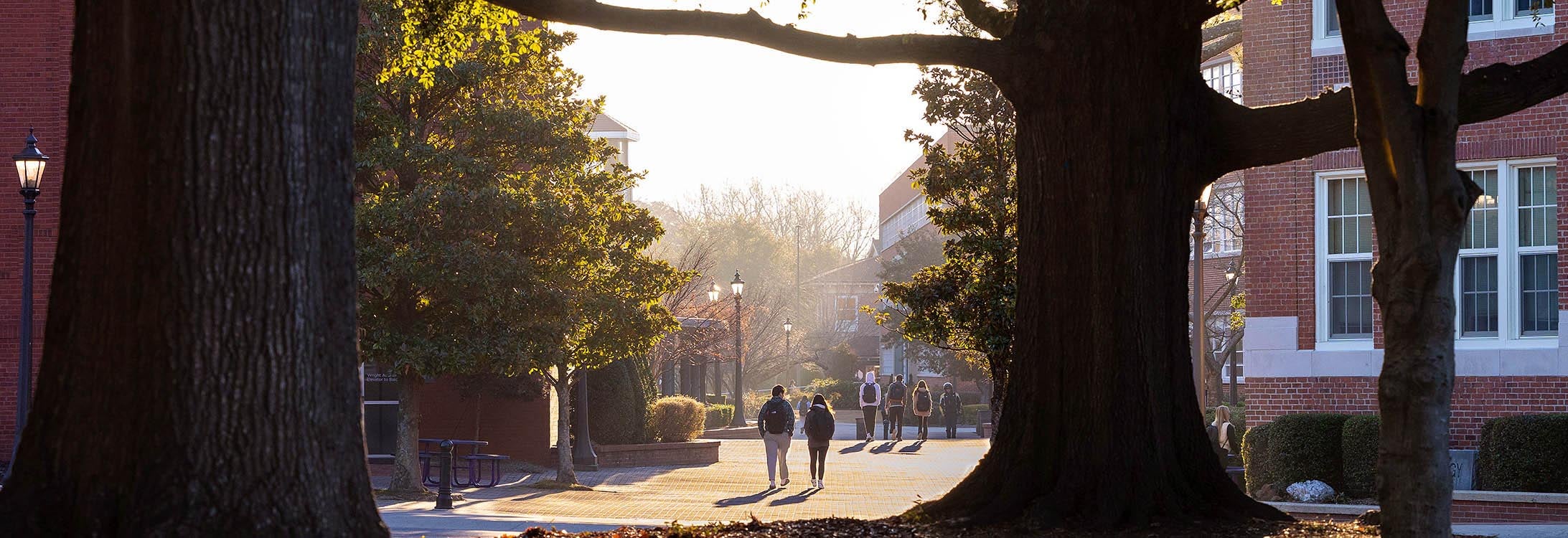SIDE BY SIDE
ECU experts say openness, empathy build foundations for friendship
On Valentine’s Day, our collective thoughts turn to love and romance. But the best romantic relationships have a foundation of friendship, and beyond that, everyone shares a need for connection with others, according to relationship experts at East Carolina University.
In college, surrounded by others the same age who may share similar interests and goals, many people form enduring friendships. But there are also challenges, pressures and internal conflicts that may make it more difficult to do so, experts say.
The need to feel connected to other people and to feel the sense of safety that comes from having people who will be there in our time of need can be as strong as our need for food and water, said Andy Brimhall, associate professor of human development and family science.

Grace Marks and Latrell Ruffin shake hands during Campus Recreation and Wellness’ Speed Friending event. (ECU photo by Rhett Butler)
SPEED FRIENDING
ECU Campus Recreation and Wellness (CRW) launched a new Speed Friending event Feb. 9 at the Main Campus Student Center, providing an opportunity for students to meet people and practice communication skills.
Students participated in icebreakers, then paired up for rapid-fire 90-second conversations with the person across the table before rotating to the next. During breaks, CRW student ambassadors presented information about healthy communication.
Investing in friendships and networking is just as important for students as their academic coursework, said Gabby Dickey, CRW’s senior assistant director of well-being. “Those friendships will pay dividends in the long run, and so if they can create those connections early, and know how to effectively communicate and foster those relationships for a lifetime, then they’re going to be much more happy.”
Sophomore Cassidy Moore, who’s majoring in interior design with a minor in hospitality, said she appreciated the opportunity to make friendship connections outside of class. “Sometimes in class, you do your work and you leave; you don’t always get to make that connection,” she said.
“People naturally desire to have that connection with people, and the more connected they are, the more they tend to thrive, and their well-being, both emotionally and physically, improves considerably,” he said.
Taylor Young, a doctoral student in the College of Health and Human Performance’s family medical therapy program, said social support is a big part of mental health.
“Most of the time when we have mental struggles and we just deal with it on our own, then it grows exponentially or it grows in our mind, and then we feel like, ‘I can’t do this,’” Young said. “But once we bring someone into the fray that we can be accountable to, just at least knowing that I’m struggling with this or maybe this is happening or that’s happening, then there’s at least someone who knows … that I’m having a hard time.”
In medical family therapy, Young said, health is viewed holistically through a biological, psychological, social and spiritual framework; instead of just focusing on the patient and their anxiety, for example, the therapist would look at how the anxiety might be affected by the social networks and systems the patient is a part of.
Something in the way
In some ways, changes in society have led to greater isolation, Brimhall said. In the past our communities were more physically centralized and people were more connected to their neighbors; people and families tended to stay in one place for longer. Now we move around a lot more, and through social media we can be connected to people all over the world, but we’re less likely to know all of our neighbors.
“That puts a tremendous amount of pressure on our partner or family members to be the primary people to meet all of our needs,” he said.
Social media can be a valuable way of connecting people with similar interests or communicating with distant family members, he said. “But I do think we miss out on some of these deeper types of connections that happen face to face, in person.”
Society also sends some messages that can get in the way of creating meaningful relationships, such as the idea that vulnerability is often seen as weakness, said Brimhall.
“We have to come across as independent, that we can stand on our own, that we don’t need other people,” he said.
The pressure to avoid vulnerability is especially strong among men, he added. For example, around Valentine’s Day, there’s a trend of women getting together with friends for “galentine’s.”
“I think that’s kind of an important and clever way to repackage the idea of Valentine’s Day a little bit,” Brimhall said. “I don’t know that I see a lot of men going out and doing that same type of activity.”
But being open and vulnerable is a big part of how we form those deeper, meaningful friendships. Brimhall pointed to an experiment by psychologist Arthur Aron in which two strangers asked each other a series of 36 questions that start out at the surface level and become increasingly personal. Then the participants answered questions about how close they felt to that person.
“And the thing that was really shocking about it,” Brimhall said, “was a lot of them reported deeper intimacy, or said, ‘I feel closer to this person’ than they did with some of their own family members.”
Be intentional
Brimhall said his advice for forming and developing deeper friendships is to be intentional. College is a unique time in life when we get to devote a lot of our intention to ourselves and be somewhat self-focused as we figure out our own interests, goals and priorities, he said. Then, as we get older and take on the responsibilities of jobs, relationships and parenting, it becomes both more difficult and more critical to develop meaningful connections.

Pursuing your own interests can also lead to friendships with others who enjoy the same pastimes. (ECU photo by Cliff Hollis)
As society has moved online and become more global, and more people are working from home rather than going to the office, “a lot of the institutions and the structures that historically have been in place for people to meet with each other and have community that have been kind of built-in naturally for us, those aren’t as common or as natural anymore, and so I think people have to be a lot more intentional about doing that and in forming some of those relationships,” he said.
“My strongest recommendation is embracing the idea of vulnerability and taking the risk,” Brimhall said. “Sometimes people are going to get hurt in that process, and that can be scary and hard, but it’s really, really hard to have meaningful relationships if you don’t.”
For ECU students, events like Campus Recreation and Wellness’ Speed Friending are a great opportunity to practice communication skills in a low-pressure environment, as well as to meet people.
“We do live in a world that is very much geared toward extroverts, and so for somebody who is introverted and maybe doesn’t feel as comfortable putting themselves out there, it can be really hard sometimes,” Brimhall said. “So that’s where it can be helpful to have those kinds of events.”
In addition to being intentional and open, Young said it’s important to accept imperfection.
“We have to remind ourselves that we are all different,” he said. There will be times that friends disagree, but it’s worth the work to accept those differences and take steps to repair the relationship.
Young also said that exploring one’s own interests is a great way to meet people, because not only does it provide a chance to meet people with similar interests, but there’s also less pressure because the activity itself is enjoyable regardless of who else is there.
Take small steps, he said, like sitting next to someone and saying “hi” rather than eating alone, or continuing a casual conversation by taking it one sentence further or asking a question that gives the other person an opportunity to open up.
With any luck, you might find yourself realizing, like the White Stripes said, “I can tell that we are gonna be friends.”
